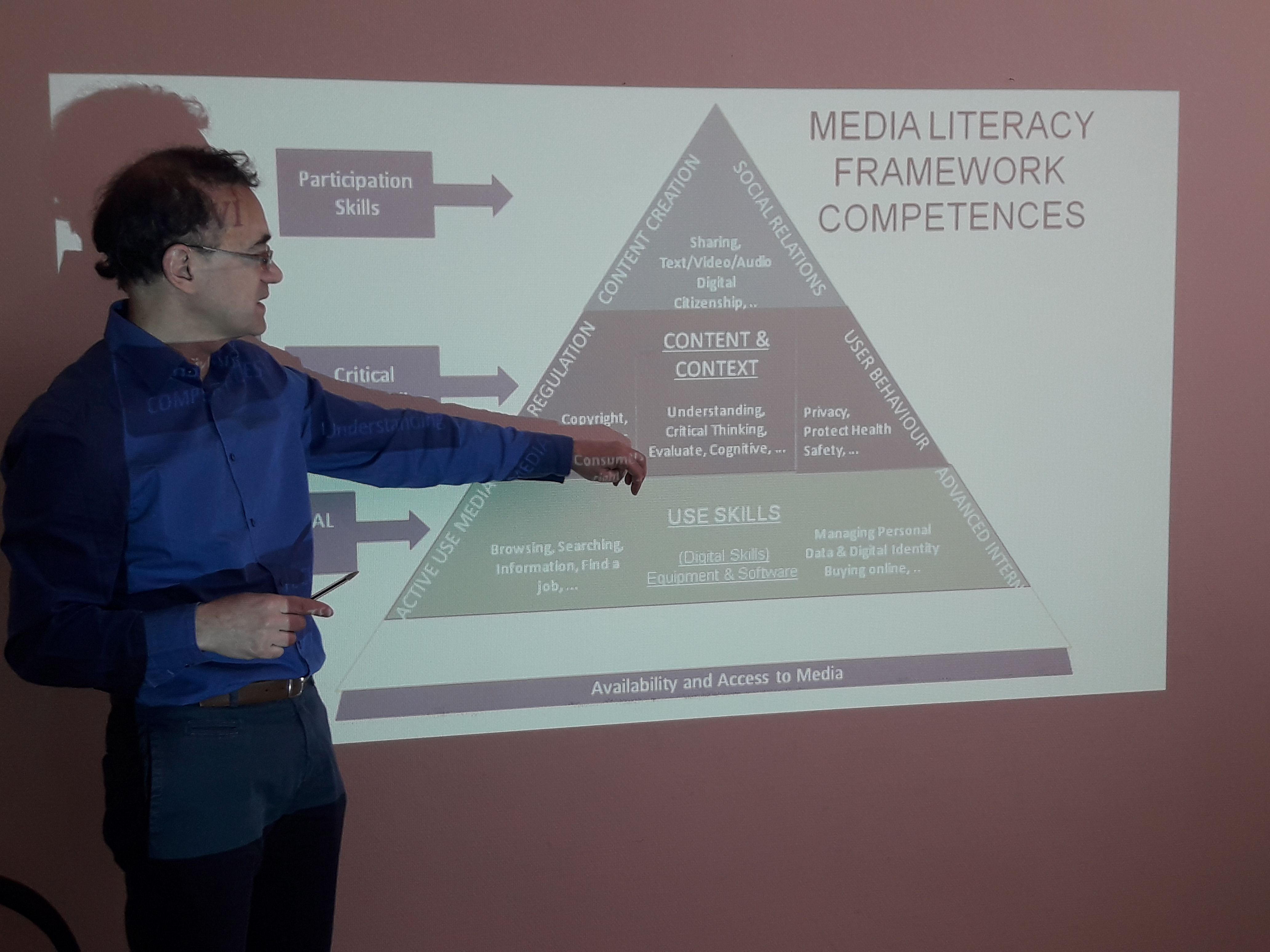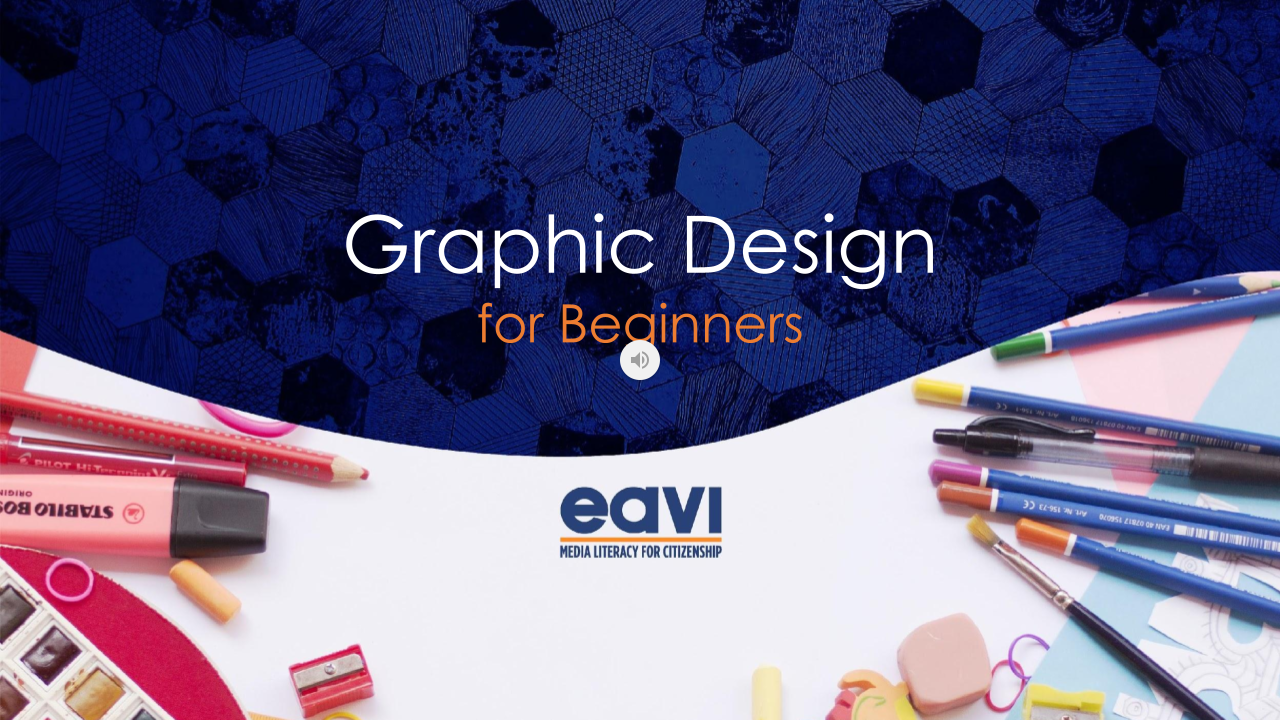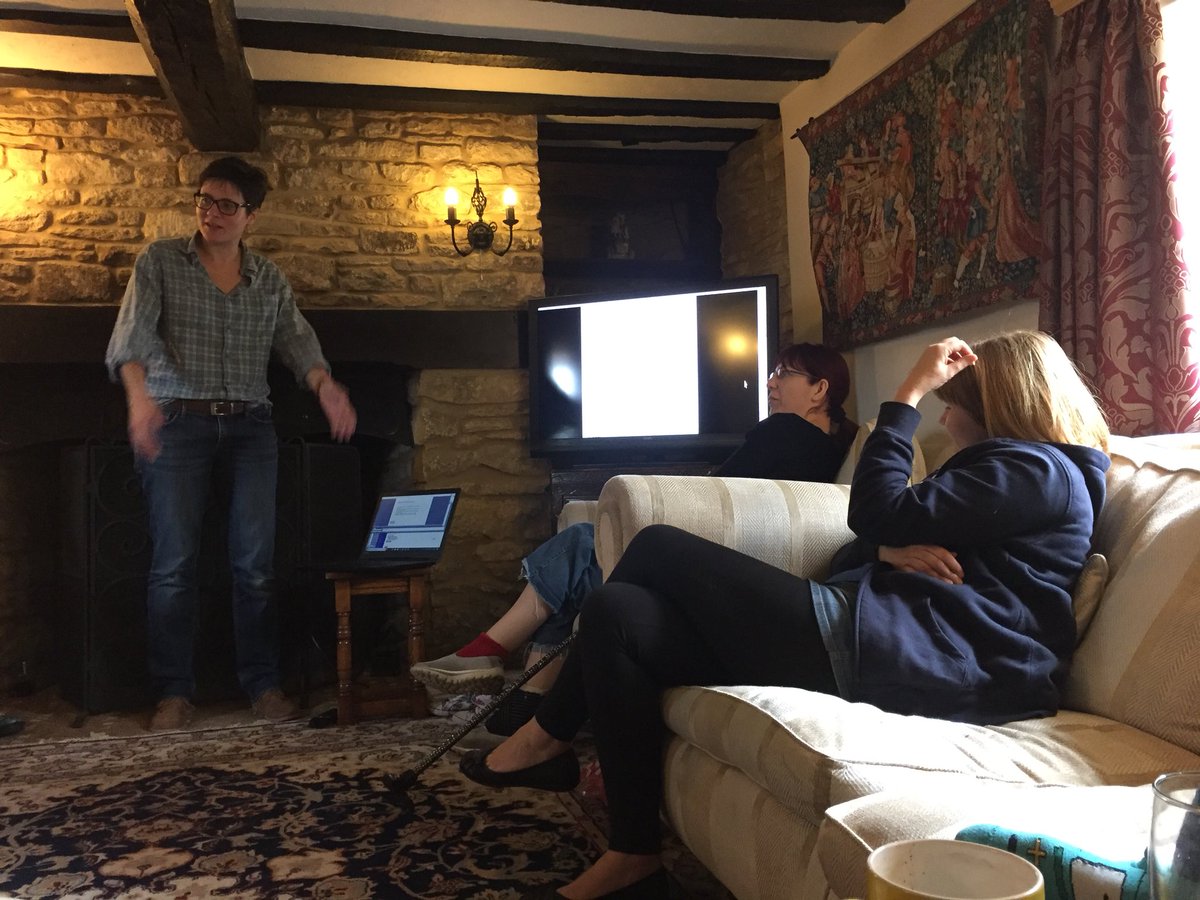On Friday, 22 June 2018, EAVI hosted a media literacy workshop for interns in Brussels to introduce them to concepts of media literacy and fact checking.
The workshop was attended by interns from Lie Detectors, Long Life Learning Platform, Culture Action Europe, AnySurfer and ULB, as well as EAVI’s new cohort of interns.
The workshop began with a presentation from EAVI’s Secretary General, Paolo Celot. He explained the definitions and concepts of media literacy, and as an illustrative example of the impact media has on our democracy, spoke about the work of Elfa Ýr Gylfadóttir who looked at the impact of Facebook’s “I Voted” button on the Icelandic elections, as well as the US election and the recent UK election and Brexit referendum.
Following this, EAVI’s Communications Officer, Naomi Thompson, led the participants through examples of media messages and how to deconstruct them. Examples included the coverage of the so-called “Tidepod Challenge”, a Disney princess film, and a social media post. She explained how the message was authored, constructed and why it was presented as it was, as well as the impact generally of media messages.
Participants then took part in a fake news exercise, using EAVI’s Fake News game, looking at various fake news articles, working out the tell-tale signs of fake news – such as the format, text, advertisements, layouts, images and subjects.
The second exercise was to look at digital footprints and the impact they can have on our day-to-day lives. Participants were given five data-points of social media users (a social media post, an internet search, an online purchase, a video and a photo), and asked to guess their age, education level, political stance and family circumstance. All participants did so with a reasonable degree of accuracy.
Naomi explained that this is how online algorithms work, and the impact that this can have on users’ lives, including going into more detail about the Cambridge Analytica scandal and how data points on media users’ were used to target potential voters with fake news.
Finally, there was an open discussion about the impact media narratives can have on society at large, looking at body image (a particularly pertinent topic for a group of young women), race, families and romance.
Feedback from participants included the following:
“I had no expectations before coming, but I ended up really enjoying the workshop – very interesting subject presented in an interactive way! Good job J”
“Great to be here. Many thanks… well done on leaving a happy audience.”
“It was stimulating, nice length.”
On Friday, 22 June 2018, EAVI hosted a media literacy workshop for interns in Brussels to introduce them to concepts of media literacy and fact checking.
The workshop was attended by interns from Lie Detectors, Long Life Learning Platform, Culture Action Europe, AnySurfer and ULB, as well as EAVI’s new cohort of interns.
The workshop began with a presentation from EAVI’s Secretary General, Paolo Celot. He explained the definitions and concepts of media literacy, and as an illustrative example of the impact media has on our democracy, spoke about the work of Elfa Ýr Gylfadóttir who looked at the impact of Facebook’s “I Voted” button on the Icelandic elections, as well as the US election and the recent UK election and Brexit referendum.
Following this, EAVI’s Communications Officer, Naomi Thompson, led the participants through examples of media messages and how to deconstruct them. Examples included the coverage of the so-called “Tidepod Challenge”, a Disney princess film, and a social media post. She explained how the message was authored, constructed and why it was presented as it was, as well as the impact generally of media messages.
Participants then took part in a fake news exercise, using EAVI’s Fake News game, looking at various fake news articles, working out the tell-tale signs of fake news – such as the format, text, advertisements, layouts, images and subjects.
The second exercise was to look at digital footprints and the impact they can have on our day-to-day lives. Participants were given five data-points of social media users (a social media post, an internet search, an online purchase, a video and a photo), and asked to guess their age, education level, political stance and family circumstance. All participants did so with a reasonable degree of accuracy.
Naomi explained that this is how online algorithms work, and the impact that this can have on users’ lives, including going into more detail about the Cambridge Analytica scandal and how data points on media users’ were used to target potential voters with fake news.
Finally, there was an open discussion about the impact media narratives can have on society at large, looking at body image (a particularly pertinent topic for a group of young women), race, families and romance.
Feedback from participants included the following:
“I had no expectations before coming, but I ended up really enjoying the workshop – very interesting subject presented in an interactive way! Good job J”
“Great to be here. Many thanks… well done on leaving a happy audience.”
“It was stimulating, nice length.”
On Friday, 22 June 2018, EAVI hosted a media literacy workshop for interns in Brussels to introduce them to concepts of media literacy and fact checking.
The workshop was attended by interns from Lie Detectors, Long Life Learning Platform, Culture Action Europe, AnySurfer and ULB, as well as EAVI’s new cohort of interns.
The workshop began with a presentation from EAVI’s Secretary General, Paolo Celot. He explained the definitions and concepts of media literacy, and as an illustrative example of the impact media has on our democracy, spoke about the work of Elfa Ýr Gylfadóttir who looked at the impact of Facebook’s “I Voted” button on the Icelandic elections, as well as the US election and the recent UK election and Brexit referendum.
Following this, EAVI’s Communications Officer, Naomi Thompson, led the participants through examples of media messages and how to deconstruct them. Examples included the coverage of the so-called “Tidepod Challenge”, a Disney princess film, and a social media post. She explained how the message was authored, constructed and why it was presented as it was, as well as the impact generally of media messages.
Participants then took part in a fake news exercise, using EAVI’s Fake News game, looking at various fake news articles, working out the tell-tale signs of fake news – such as the format, text, advertisements, layouts, images and subjects.
The second exercise was to look at digital footprints and the impact they can have on our day-to-day lives. Participants were given five data-points of social media users (a social media post, an internet search, an online purchase, a video and a photo), and asked to guess their age, education level, political stance and family circumstance. All participants did so with a reasonable degree of accuracy.
Naomi explained that this is how online algorithms work, and the impact that this can have on users’ lives, including going into more detail about the Cambridge Analytica scandal and how data points on media users’ were used to target potential voters with fake news.
Finally, there was an open discussion about the impact media narratives can have on society at large, looking at body image (a particularly pertinent topic for a group of young women), race, families and romance.
Feedback from participants included the following:
“I had no expectations before coming, but I ended up really enjoying the workshop – very interesting subject presented in an interactive way! Good job J”
“Great to be here. Many thanks… well done on leaving a happy audience.”
“It was stimulating, nice length.”









































































































































































